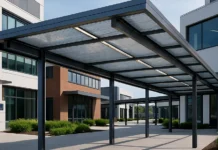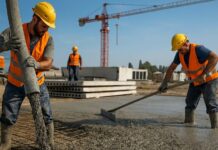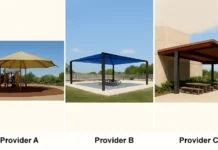Falls are among the most serious safety risks in the construction industry. The consequences can be significant, ranging from serious injuries to fatalities. Businesses must take steps to promote a more secure and risk-free working environment.
The following practices and philosophies can help your team achieve a safer jobsite — and save lives.
1. Identify the Liabilities
Conduct site-specific risk assessments and identify the hazards for each project. In recent years, falls have caused more than 30% of construction-related deaths, and there are common denominators that contribute to such accidents. Companies must record these factors, from elevated work surfaces to slip-prone floors.
Along with compiling this list, you should note the likelihood of accidents occurring, as well as the severity of these hazards. Identifying the liabilities is the first step in preventing them.
2. Employ Personal Fall Arrest Systems
Working on buildings will entail heights, and using personal fall arrest systems like full-body harnesses can keep construction employees safe. Ensure they’re the right size and that workers understand how to wear them correctly.
The harness should have a ring on the back that teams can strap up and connect as a lifeline in case of falls. It should be attached securely without sacrificing mobility to continue work.
3. Install Guardrails
Combine personal fall arrest systems with safety guardrails. These barriers can help deter falls from rooftops, elevated hallways and more. Construction should be well-made to handle the brunt of people leaning or shifting their weight.
Another fall protection system that can work well with guardrails is safety nets. If someone falls over, the net can help catch them and minimize injury risks.
4. Provide Training to Workers
Safety training can also be key to avoiding falls, especially for newer workers. Share information about fall protection equipment and how teams should navigate the site. Insights on safely utilizing ladders and scaffolds can go a long way.
Teams can also provide refresher training courses to the crew’s more experienced employees. These help remind them of how to stay secure on the job, and they can keep them as a reference to guide others when on-site.
5. Keep the Work Area Clean and Well-Lit
Another way to prevent construction falls is to have clean work areas. The less clutter there is, the fewer possibilities of slipping, tripping and falling. Arrange daily organization tasks before starting the project, and run daily cleanups moving forward.
Prioritize adequate visibility, especially when project operations continue into darker portions of the day. Add light fixtures, and equip workers with a flashlight that they can use at their discretion.
6. Add Hole Covers to Openings
Add covers for windows, doors, floor holes and other openings on the worksite to minimize future instances of tripping and falling. These should support twice the mass of employees and equipment at all times.
Always keep your team informed about where hole coverings are located. Awareness helps prevent personnel from accidentally navigating too closely around the holes.
7. Leverage More Technology
Advanced technology, like wearables and sensors, can be key in monitoring employees and determining whether they’re at risk of such incidents. Before deployment, employees should be fully informed about the biometric information they are being monitored for.
Closed-circuit television (CCTV) systems can be useful for seeing different areas around the jobsite and recording any instances for future review. Ensure these are pointed at any fall-prone areas.
8. Have a Proper Work Plan
The ideal work schedule can be conducive to fall prevention. For instance, you may minimize the number of workers assigned to more accident-prone areas or schedule your more experienced personnel to work in these zones.
Construction companies should also foster a culture of safety accountability. You can execute a buddy system where workers monitor one another. Consider holding a weekly safety check-in between leaders and teams.
9. Practice Equipment Inspections
Similar to daily site cleanings, exercise daily fall protection equipment inspections. Details such as tears, loose threads or hook breaks can affect an employee’s safety. Be diligent in checking before and after operations.
Properly dispose of any damaged or worn-out equipment from the site to ensure no one uses faulty fall protection systems. Ensure your team promptly reports safety risks and equipment issues to the team leaders.
Fall Prevention Is Employee Protection
Fall prevention activities ensure a safer working environment and minimize unwanted accidents. Whether it’s a startup construction team or a tenured group of professionals, take the proper precautions and protect employees.

































